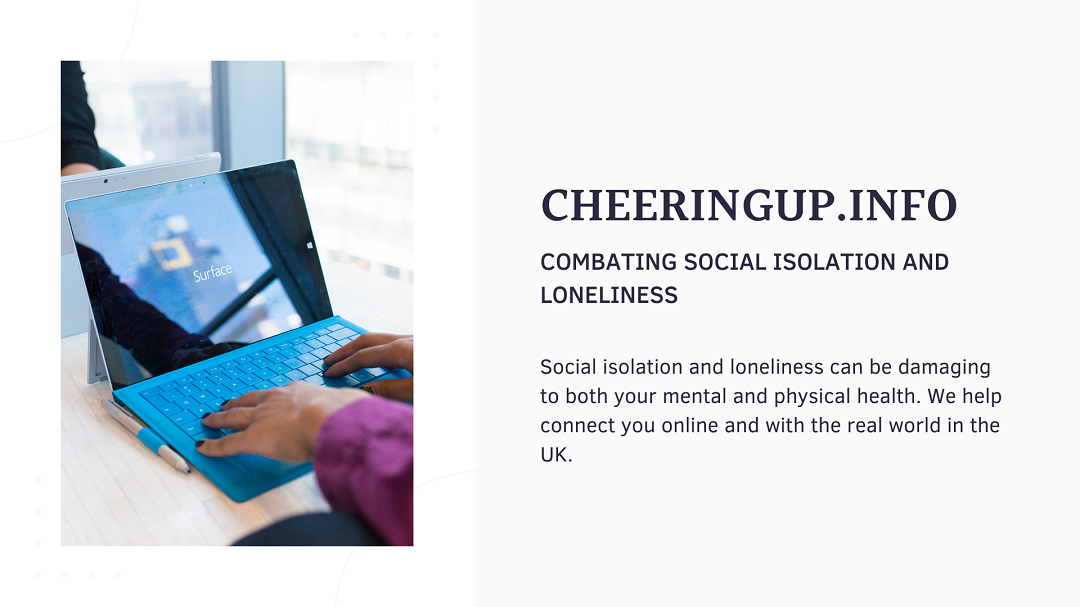Connect with others online face to face
Create the right fundamental base to build a better fuller life in UK. Find out how to boost your sleep fitness and diet. Be more mindful of and connect with the present moment. Identify the things already in your life you should be grateful for and appreciate them more.
Share your life with others online. Learn how to identify and control feelings of loneliness. Feel better about life in the UK. Chatting online help to banish loneliness.
Enter code #ConnectOnline
Solitude Vs. Loneliness
There is a difference between solitude and loneliness – the first can be pleasurable but the second is often painful.
Solitude and loneliness are two concepts that are often used interchangeably, but they are in fact two distinct experiences. While solitude refers to being alone by choice, loneliness refers to the feelings of isolation and lack of connection that can occur even when surrounded by people.
Solitude is a state in which an individual is free from distractions and is able to focus on their thoughts and emotions. This can be a pleasurable experience, allowing for introspection, reflection and a chance to recharge. Many creative and intellectual pursuits, such as writing, painting, or meditation, often require solitude in order to be truly productive. Solitude can also be a source of strength, helping individuals to become more self-reliant and independent.
In contrast, loneliness is a painful and unpleasant experience that is often characterized by feelings of sadness, hopelessness, and boredom. It is a result of a lack of meaningful social connections and a feeling of disconnection from others. People can feel lonely even when they are surrounded by people, and the experience is often described as feeling disconnected and disconnected from the world around them.
Loneliness is a growing problem in modern society, with many people feeling disconnected and isolated due to the fast-paced and busy lives they lead. This can lead to feelings of depression, anxiety, and even physical illness. It is therefore important for individuals to make an effort to form meaningful social connections, whether through spending time with family and friends, volunteering, or joining clubs and organizations.
Solitude and loneliness are two very different experiences, with solitude being a source of pleasure and reflection, while loneliness is a source of pain and suffering. By understanding the difference between these two experiences and taking steps to form meaningful social connections, individuals can avoid the negative effects of loneliness and instead enjoy the benefits of solitude.
If you are lonely in the evenings weekends or on holidays connect more online
Find out about upcoming online events discussions and webinars to experience a new life online. Interact online to banish loneliness in the UK. Combat loneliness. Overcome feelings of loneliness.

Promote and market your business on CheeringupInfo for 12 months
Put your products and services in front of new customers already interested in your business offering before your competitors do.

Link into your existing sales process direct from CheeringupInfo or use our eCommerce solutions to increase your sales cash flow and profit
Increase the sources of your revenue streams more sustainably. Grow your business faster with CheeringupInfo.
Loneliness: Health Dangers
Loneliness is often thought of as a social problem, but it can have significant negative effects on physical health and longevity. While it is natural for individuals to feel lonely at times, chronic loneliness can be dangerous and contribute to various health problems. In this article, we will explore the dangers of loneliness to health and longevity and provide some strategies to combat loneliness.
What is loneliness?
Loneliness is a feeling of sadness or isolation that arises when an individual perceives a lack of social connections or support. It is not necessarily the same as being alone, as individuals can feel lonely even when surrounded by people. Loneliness can be short-term, such as after a break-up, or it can be chronic, persisting for extended periods.
The Dangers of Loneliness
Loneliness can lead to a range of physical and mental health problems. Here are some of the most significant dangers of loneliness:
- Cardiovascular disease
Loneliness is a significant risk factor for cardiovascular disease. Individuals who feel lonely have higher levels of stress hormones, which can lead to chronic inflammation, a precursor to many cardiovascular diseases. Chronic loneliness can also contribute to high blood pressure, atherosclerosis, and other cardiovascular problems.
- Depression and anxiety
Loneliness can lead to depression and anxiety. When individuals feel isolated, they may become preoccupied with negative thoughts and emotions, leading to depression and anxiety. Chronic loneliness can contribute to other mental health issues, such as substance abuse and personality disorders.
- Weakened immune system
Loneliness can weaken the immune system. The stress hormones that are produced in response to loneliness can suppress the immune system, making it more difficult for the body to fight off infections. Chronic loneliness can also contribute to chronic inflammation, which can lead to a range of health problems.
- Cognitive decline
Loneliness can contribute to cognitive decline. When individuals feel lonely, they may engage in less social interaction and cognitive stimulation, which can lead to reduced brain function. Chronic loneliness can contribute to the development of dementia and Alzheimer’s disease.
- Premature mortality
Loneliness can contribute to premature mortality. Chronic loneliness has been associated with an increased risk of death from all causes, including cardiovascular disease, cancer, and suicide.
How to Combat Loneliness
If you are feeling lonely, there are several strategies you can use to combat loneliness:
- Connect with others
One of the most effective ways to combat loneliness is to connect with others. Joining social groups or clubs, volunteering, or participating in hobbies can help individuals build social connections and combat feelings of isolation.
- Seek professional help
If you are struggling with chronic loneliness, seeking professional help can be beneficial. Mental health professionals can provide support and guidance to individuals struggling with loneliness and associated mental health problems.
- Engage in self-care
Engaging in self-care activities, such as exercise, meditation, and spending time outdoors, can help reduce stress and promote emotional well-being. These activities can also help individuals build self-confidence, which can make it easier to connect with others.
- Seek support from loved ones
Talking to loved ones about feelings of loneliness can be helpful. Loved ones can provide emotional support and may be able to offer suggestions for ways to build social connections.
- Consider adopting a pet
Pets can provide emotional support and help individuals combat feelings of loneliness. Studies have shown that pet ownership can lead to reduced stress and increased social interaction.
Loneliness is a significant risk factor for physical and mental health problems and can contribute to premature mortality. If you are feeling lonely, it is essential to take steps to combat these feelings. Connecting with others, seeking professional help, engaging in self-care, seeking support from loved ones, and considering pet ownership are all effective strategies to combat loneliness. By taking steps to combat loneliness, individuals can improve
#CheeringupInfo #BanishLoneliness #Loneliness #MeetupOnline #OnlineDiscussions #ChatOnline #UKchat #UKonline #IsolationManagement #SocialIsolation #MentalHealth #MentalHealthAwareness #MentalHealthMatters #MentalWellbeing
Banish Loneliness Stay Together Online with CheeringupInfo

